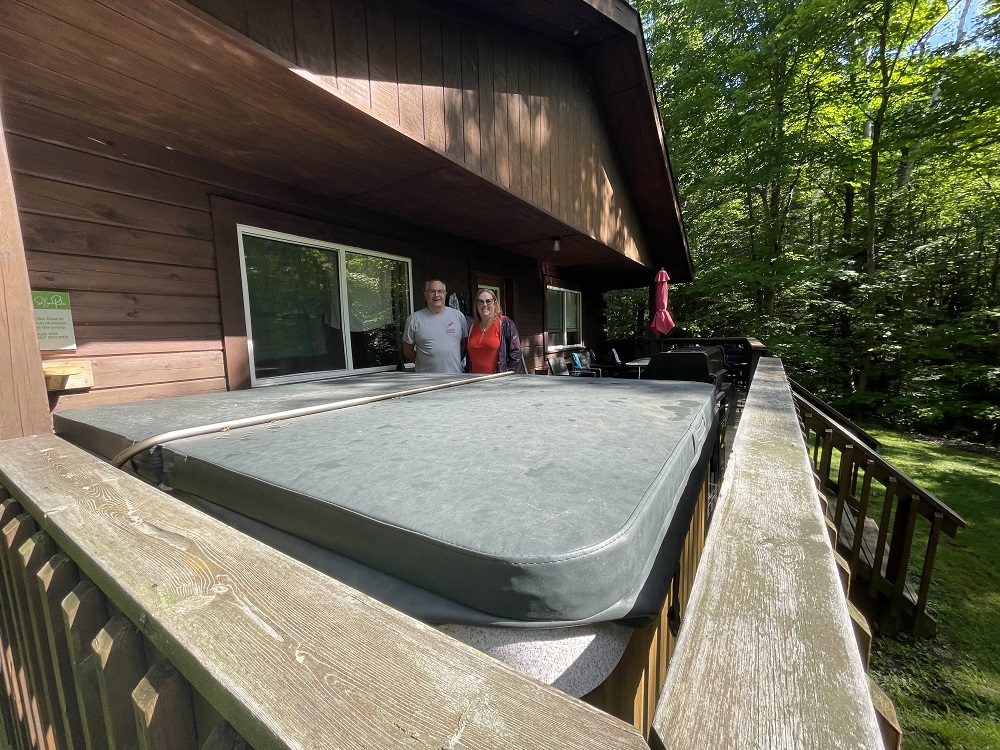Haliburton County council is voicing its displeasure with recent closures of Highlands hot tubs.
This summer, multiple accommodators had hot tubs, located in or next to private rooms, closed due to non-compliance with Ontario-wide regulations that require operators with more than six rooms to comply with the same rules governing hot tubs at public pools or hotels.
Buttermilk Falls Resort and Lakeview Motel claimed such rules unfairly target small resort operators who have neither the funds or space to satisfy the rules, which include having telephone landlines next to the hot tub, or requiring them to be shut down at specific times.
“I’m very sad for the motel and hotels that this is affecting in our County,” said Dysart et al mayor Andrea Roberts at an Aug. 24 council meeting.
She added, “I think the only move forward in this is to request a change in the regulation. A large hotel should not be treated the same as a motel unit with one (hot tub) out the door.”
Resort operators said other health units are not enforcing the regulations.
Algonquin Highlands mayor Carol Moffatt said, “inconsistent application of this is absolutely ridiculous.”
Minden Hills mayor Brent Devolin compared the issue to the enforcement of COVID-19 rules in the health unit, with certain issues enforced more strictly.
“Definitely, the director of our regions can set the priorities without explicit ‘thou shalt not’,” he said.
Council voted to send a letter to MPP Laurie Scott to ask that Ontario Regulation 565 be amended to record a distinction between commercial hot tubs and small residential hot tubs used in commercial settings. It will also be sent to members of the Haliburton Kawartha Pine Ridge (HKPR) District board of health.
In an emailed statement, Scott’s office said “MPP Scott is aware of the issues businesses are experiencing regarding the enforcement of the regulation on public pools and is working diligently with the Ministry of Health on a solution to help support local businesses while maintaining public health standards in appropriate settings.”
The HKPR health unit previously told The Highlander complaints led to the enforcement of the Ontario rules.
The health unit said multiple infractions led to the closures, including not notifying local health units, not having emergency telephones, having no chemistry records or safety records, circulation system being off, and having no emergency stop button.
Electric vehicle may not be feasible
Haliburton County is set to modernize its fleet with an electric car, depending on price and availability.
The current vehicle in use, shared with the library, is at the end of its life.
“It is actually challenging to get parts for that type of vehicle… we’re hoping to get it through the end of the year,” said director of public works Robert Sutton.
Warden Liz Danielsen asked if the County is ready for an electric vehicle due to difficulties charging or maintaining a charge.
Sutton said, “all options are available,” noting supply issues with electric cars.
“Right now, we’re carrying the cost for a standard electric vehicle in the budget.”
Coun. Cec Ryall asked about ways to ensure electric vehicles could remain on the road even during power loss. Sutton said he’s not aware of generator backups for chargers.
“If you went full electric, you’d want to have some sort of backup system.”
Devolin said acquiring electric vehicles could remain a challenge far into the future with long lead times on securing them.
“Those are things staff and council are going to have to talk about as part of your next budget cycle,” he said.





